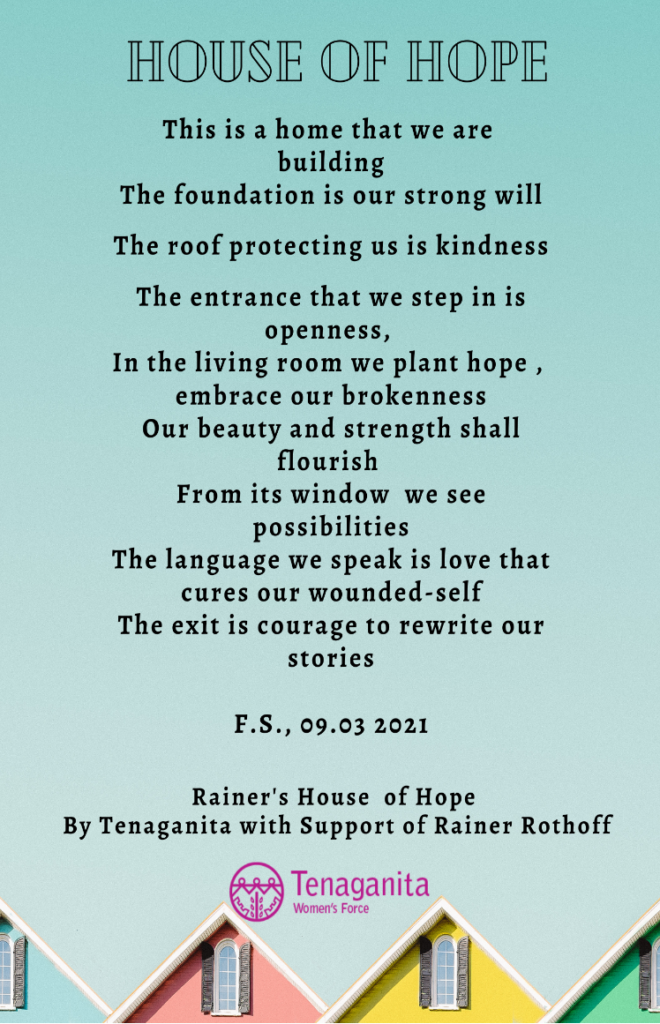Shelter for women in crisis
Shelters for Women and Child Survivors of Human Trafficking or in Crisis
Mission
The History
Tenaganita’s Shelters offer safe spaces where survivors’ current needs are fulfilled while their rights are being redressed until their safe repatriation.
- Tenaganita’s shelters protect and assist trafficked persons by providing:-
- – Temporary accommodation in a secure, warm and trusted environment
- – Food, clothes and hygiene products
- – Access to health care
- – Access to psychological and counselling care
- – Legal support and intervention
- – Recovery and empowerment
- – Informal training and information sharing regarding human and labour rights and the indicators that can lead to human trafficking
- – Skills training and enrichment activities
- To act as a mediator between authorities (i.e. police, immigration, legal service, medical personnel) and the trafficked person.
- To do documentation for the purposes of doing advocacy and legal intervention.
- To provide information to enable education, awareness raising and campaign to stop the crime of trafficking in persons.
It is a challenge to secure core funding in order to keep the shelter doors open. Donors and funders see Malaysia as a developing country, therefore, the funds are often channelled to under developed countries for other programs. As a result, much time and energy is spent by staff and volunteers alike on fundraising activities in order to keep the Shelters’ ‘Doors’ open.
Since its inception in 1991, Tenaganita’s work has encompassed a wide variety of women and gender issues, expanding to include sex workers, trafficked persons, individuals afflicted with HIV/AIDS, migrants, refugees and stateless persons.
However, one of the greatest challenges the organization faces is when women and children who are in need of Tenaganita’s services require protection and shelter.
With the help of dedicated staff and volunteers Tenaganita’s mission for the shelters is to provide an environment in which survivors of various abuses are free to rest, recover, seek counselling and overcome the trauma they encountered while they await the completion of their legal cases, develop future plans for themselves and prepare for repatriation.
The Shelters maintain the confidentiality of each person’s record. It also practices a non-discrimination policy, and takes in people regardless of ethnic background, colour, religion, politics, nationality or social origin, property, birth or status.
Our Shelters
1) Selangor Shelter
Since its inception in 2006 until 31st March 2011, the Selangor shelter, sheltered more than 352 trafficked survivors from Malaysia, Thailand, Indonesia, Philippines, Vietnam, Cambodia, China, Sri Lanka, Burma and India. Tenaganita had to close the Shelter in March 2011 as there were no further funds to sustain the shelter.
In June 2012, Tenaganita managed to secure some funding from local faith based organizations which enabled the shelter to reopen.
Since June 2012, until the end of 2018 it had sheltered a further 312 women and children.
2) Penang Shelter
On November 1st 2014 with funds primarily from private donations, Tenaganita opened a shelter in Penang. By the end of 2018 it had sheltered 148 women and children of different nationalities.
In July 2017, the Shelter was recognised by Malaysia’s Home Ministry as a Shelter for trafficked survivors. As part of the service to the Home Ministry an office was opened in Penang. This office is used for meetings between Police/Immigration/Welfare Department officials and survivors, activities for the survivors, a weekly Legal Aid Clinic and general administrative work.
Shelter Activities
The shelters rely on the staff and dedicated volunteers to provide skills training and enrichment activities. These activities add diversity and allow for unique forms of expression in a community of individuals with varying nationalities and ethnic backgrounds. Additionally, the activities are designed to develop skills that can be utilized in the future outside the shelter, such as foreign language proficiency and entrepreneurial skills.
Activities provided at the shelters include:-
• Cooking and baking
• Handicrafts
• Art classes
• Crochet classes
• Sewing
• Dance classes
• Exercise classes
• Yoga classes
• English classes
• Flower and vegetable gardening
• Candle making
• Basket weaving
Rainer's House of Hope
Rainer’s House of Hope by Tenaganita (RHH) is a specific half-way house (shelter) specifically dedicated for GBV survivors.
Initiation of RHH is a close working relationship between Tenaganita and refugee women communities and support group that feel the need of accessible safe house for refugee women GBV survivors. With kind support of Rainer Rotthoff who provide the house for that purpose Tenaganita launched RHH on 21 March 2021.
RHH is still a work in progress, expected to enable GBV survivors to recover from traumatic experience and empower themselves and able to build independent living by providing temporary safe place (up to 3 months); psychosocial support and educational activities to facilitate recovery and empowerment; and building bridge toward independent living of the GBV survivors.

